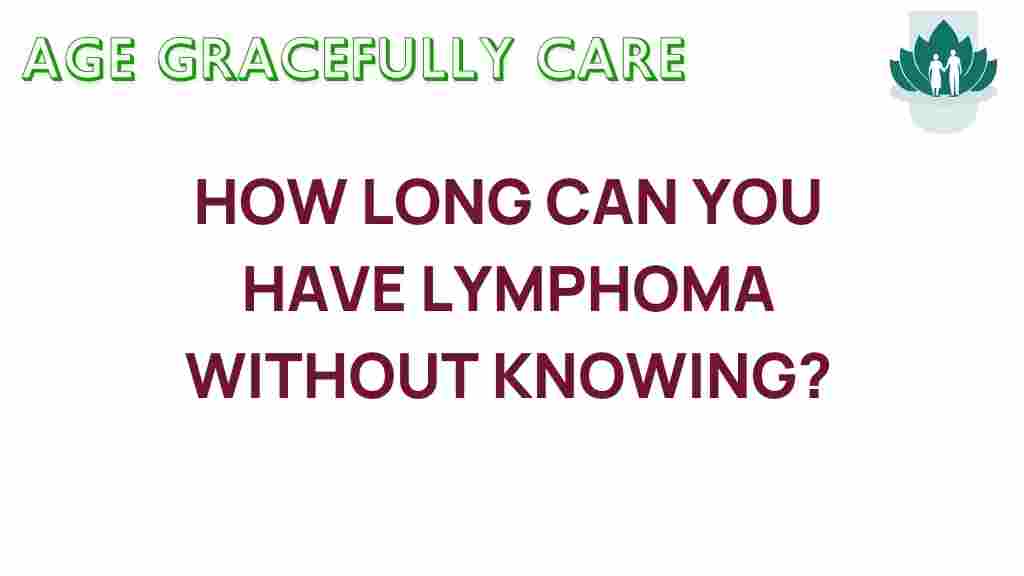The Silent Battle: How Long Can You Have Lymphoma Unnoticed?
Lymphoma is a type of cancer that originates in the lymphatic system, which is a crucial part of the immune system. This disease can often go unnoticed due to its subtle onset and vague symptoms. Understanding the early symptoms, the importance of diagnosis, and the available treatment options is vital for increasing cancer awareness and improving outcomes. In this article, we will explore how lymphoma can remain undetected, the health risks associated with this silent disease, and what steps can be taken for early detection and treatment.
Understanding Lymphoma
Lymphoma is primarily divided into two main types: Hodgkin lymphoma and non-Hodgkin lymphoma. Each type has different characteristics and can affect individuals differently. The lymphatic system plays a crucial role in the body’s immune response, and lymphoma can disrupt this function, leading to serious health risks.
The Silent Nature of Lymphoma
Lymphoma is often referred to as a “silent disease” because many individuals may not experience noticeable symptoms in the early stages. This can lead to delayed diagnosis and treatment, increasing the risk of the cancer progressing. Here are some reasons why lymphoma can go unnoticed:
- Subtle Early Symptoms: Many of the early symptoms of lymphoma can be easily mistaken for other common illnesses.
- Vague Discomfort: Symptoms such as fatigue or mild fever may not raise immediate concerns.
- Lack of Awareness: Many people are not familiar with the early signs of lymphoma, leading to underreporting.
Recognizing Early Symptoms of Lymphoma
Being aware of the early symptoms of lymphoma can significantly impact early diagnosis and treatment. Common early symptoms may include:
- Painless Swollen Lymph Nodes: One of the most common signs is swollen lymph nodes in the neck, armpit, or groin.
- Unexplained Weight Loss: Sudden weight loss without trying can be an alarming symptom.
- Night Sweats: Profuse sweating at night can be a sign of lymphoma.
- Fatigue: Persistent fatigue that doesn’t improve with rest may indicate underlying health issues.
- Fever: Recurrent fevers without an apparent cause can be a symptom.
- Itchy Skin: Some individuals experience unexplained itching, which can be linked to lymphoma.
If you notice any of these symptoms persisting over time, it is essential to consult a healthcare professional for further evaluation.
The Importance of Early Diagnosis
Early diagnosis of lymphoma is crucial for effective treatment. The longer lymphoma goes undetected, the more it can spread and affect the body’s immune system. Here are steps involved in the diagnosis process:
- Medical Consultation: If symptoms persist, schedule an appointment with your healthcare provider.
- Physical Examination: Your doctor will conduct a thorough physical examination, checking for swollen lymph nodes.
- Blood Tests: Blood tests can help identify abnormalities in blood cells and immune function.
- Imaging Tests: Imaging techniques such as CT scans or PET scans can help visualize lymph nodes and any potential tumors.
- Biopsy: A definitive diagnosis often requires a biopsy, where a sample of lymphatic tissue is examined for cancerous cells.
Regular check-ups and monitoring of symptoms are crucial for early detection, which can dramatically improve treatment success rates.
Treatment Options for Lymphoma
The treatment for lymphoma varies depending on the type and stage of the disease. Here are the most common treatment options:
- Chemotherapy: This treatment involves using drugs to kill cancer cells, often administered in cycles.
- Radiation Therapy: High-energy rays are used to target and kill cancer cells in specific areas.
- Immunotherapy: This treatment helps boost the immune system’s ability to fight lymphoma.
- Stem Cell Transplant: This procedure helps restore the body’s supply of blood-forming cells after chemotherapy.
- Targeted Therapy: These drugs target specific vulnerabilities in cancer cells, minimizing damage to healthy cells.
Each treatment option has its benefits and potential side effects. A healthcare provider can help determine the most appropriate treatment plan based on individual circumstances.
Health Risks Associated with Lymphoma
Living with undiagnosed lymphoma poses several health risks, including:
- Progression of Disease: If left untreated, lymphoma can advance to more severe stages, making treatment more challenging.
- Weakened Immune System: Lymphoma can compromise the immune system, increasing susceptibility to infections.
- Organ Damage: As lymphoma spreads, it can affect vital organs, leading to further health complications.
Awareness of these risks can motivate individuals to seek medical advice if they experience any concerning symptoms.
Steps to Boost Cancer Awareness
Raising awareness about lymphoma and its early symptoms is crucial in the fight against cancer. Here are some steps to consider:
- Educate Yourself: Understanding lymphoma and its symptoms empowers individuals to recognize changes in their health.
- Share Information: Use social media platforms to spread awareness about lymphoma and encourage others to learn.
- Participate in Events: Join cancer awareness events or support groups to connect with others and promote education.
- Advocate for Regular Check-Ups: Encourage friends and family to prioritize their health and schedule regular medical examinations.
By taking these steps, we can collectively work towards improving early detection and treatment outcomes for lymphoma.
Conclusion
Lymphoma is a silent battle that many individuals face without even knowing it. Understanding the early symptoms, the importance of diagnosis, and the treatment options available is essential for promoting health and well-being. If you or someone you know experiences any persistent symptoms, it is crucial to seek medical attention promptly.
For more information on cancer awareness and lymphoma, visit American Cancer Society. Remember, early detection can save lives, and raising awareness is a vital part of this process.
For additional resources on lymphoma and patient support, check out our support page.
This article is in the category Health and created by AgeGracefullyCare Team
